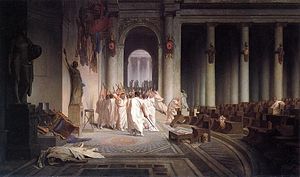
The Death of Caesar, by Jean-Léon Gérôme (1867). On 15 March 44 BC, Octavius's adoptive father Julius Caesar was assassinated by a conspiracy led by Marcus Junius Brutus and Gaius Cassius Longinus.
To make a successful entry into the upper echelons of the Roman political hierarchy, Octavian could not rely on his limited funds. After a warm welcome by Caesar's soldiers at Brundisium, Octavian demanded a portion of the funds that were allotted by Caesar for the intended war against Parthia in the Middle East. This amounted to 700 million sesterces stored at Brundisium, the staging ground in Italy for military operations in the east. A later senatorial investigation into the disappearance of the public funds made no action against Octavian, since he subsequently used that money to raise troops against the Senate's arch enemy, Mark Antony. Octavian made another bold move in 44 BC when without official permission he appropriated the annual tribute that had been sent from Rome's Near Eastern province to Italy. Octavian began to bolster his personal forces with Caesar's veteran legionaries and with troops designated for the Parthian war, gathering support by emphasizing his status as heir to Caesar. On his march to Rome through Italy, Octavian's presence and newly acquired funds attracted many, winning over Caesar's former veterans stationed in Campania. By June he had gathered an army of 3,000 loyal veterans, paying each a salary of 500 denarii.
Arriving in Rome on 6 May 44 BC, Octavian found the consul Mark Antony, Caesar's former colleague, in an uneasy truce with the dictator's assassins; they had been granted a general amnesty on 17 March, yet Antony succeeded in driving most of them out of Rome. This was due to his "inflammatory" eulogy given at Caesar's funeral, mounting public opinion against the assassins. Although Mark Antony was amassing political support, Octavian still had opportunity to rival him as the leading member of the faction supporting Caesar. Mark Antony had lost the support of many Romans and supporters of Caesar when he at first opposed the motion to elevate Caesar to divine status. Octavian failed to persuade Antony to relinquish Caesar's money to him. However, during the summer he managed to win support from Caesarian sympathizers, who saw the younger heir as the lesser evil and hoped to manipulate him, or to bear with him during their efforts to get rid of Antonius. In September, the Optimate orator Marcus Tullius Cicero began to attack Antony in a series of speeches portraying Antony as the greatest threat to the order of the Senate. With opinion in Rome turning against him and his year of consular power nearing its end, Antony attempted to pass laws which would lend him control over Cisalpine Gaul, which had been assigned as part of his province, from Decimus Junius Brutus Albinus, one of Caesar's assassins. Octavian meanwhile built up a private army in Italy by recruiting Caesarian veterans, and on 28 November won over two of Antony's legions with the enticing offer of monetary gain. In the face of Octavian's large and capable force, Antony saw the danger of staying in Rome, and to the relief of the Senate he fled to Cisalpine Gaul, which was to be handed to him on 1 January.

0 comments:
Post a Comment